Daohan Lu
Cambrian-S: Towards Spatial Supersensing in Video
Nov 06, 2025Abstract:We argue that progress in true multimodal intelligence calls for a shift from reactive, task-driven systems and brute-force long context towards a broader paradigm of supersensing. We frame spatial supersensing as four stages beyond linguistic-only understanding: semantic perception (naming what is seen), streaming event cognition (maintaining memory across continuous experiences), implicit 3D spatial cognition (inferring the world behind pixels), and predictive world modeling (creating internal models that filter and organize information). Current benchmarks largely test only the early stages, offering narrow coverage of spatial cognition and rarely challenging models in ways that require true world modeling. To drive progress in spatial supersensing, we present VSI-SUPER, a two-part benchmark: VSR (long-horizon visual spatial recall) and VSC (continual visual spatial counting). These tasks require arbitrarily long video inputs yet are resistant to brute-force context expansion. We then test data scaling limits by curating VSI-590K and training Cambrian-S, achieving +30% absolute improvement on VSI-Bench without sacrificing general capabilities. Yet performance on VSI-SUPER remains limited, indicating that scale alone is insufficient for spatial supersensing. We propose predictive sensing as a path forward, presenting a proof-of-concept in which a self-supervised next-latent-frame predictor leverages surprise (prediction error) to drive memory and event segmentation. On VSI-SUPER, this approach substantially outperforms leading proprietary baselines, showing that spatial supersensing requires models that not only see but also anticipate, select, and organize experience.
Out-of-Distribution Detection Methods Answer the Wrong Questions
Jul 02, 2025Abstract:To detect distribution shifts and improve model safety, many out-of-distribution (OOD) detection methods rely on the predictive uncertainty or features of supervised models trained on in-distribution data. In this paper, we critically re-examine this popular family of OOD detection procedures, and we argue that these methods are fundamentally answering the wrong questions for OOD detection. There is no simple fix to this misalignment, since a classifier trained only on in-distribution classes cannot be expected to identify OOD points; for instance, a cat-dog classifier may confidently misclassify an airplane if it contains features that distinguish cats from dogs, despite generally appearing nothing alike. We find that uncertainty-based methods incorrectly conflate high uncertainty with being OOD, while feature-based methods incorrectly conflate far feature-space distance with being OOD. We show how these pathologies manifest as irreducible errors in OOD detection and identify common settings where these methods are ineffective. Additionally, interventions to improve OOD detection such as feature-logit hybrid methods, scaling of model and data size, epistemic uncertainty representation, and outlier exposure also fail to address this fundamental misalignment in objectives. We additionally consider unsupervised density estimation and generative models for OOD detection, which we show have their own fundamental limitations.
On Scaling Up 3D Gaussian Splatting Training
Jun 26, 2024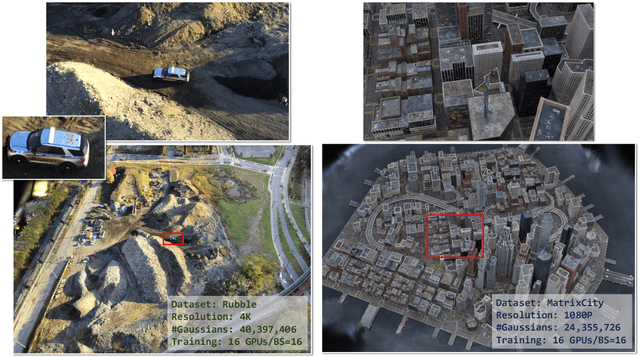



Abstract:3D Gaussian Splatting (3DGS) is increasingly popular for 3D reconstruction due to its superior visual quality and rendering speed. However, 3DGS training currently occurs on a single GPU, limiting its ability to handle high-resolution and large-scale 3D reconstruction tasks due to memory constraints. We introduce Grendel, a distributed system designed to partition 3DGS parameters and parallelize computation across multiple GPUs. As each Gaussian affects a small, dynamic subset of rendered pixels, Grendel employs sparse all-to-all communication to transfer the necessary Gaussians to pixel partitions and performs dynamic load balancing. Unlike existing 3DGS systems that train using one camera view image at a time, Grendel supports batched training with multiple views. We explore various optimization hyperparameter scaling strategies and find that a simple sqrt(batch size) scaling rule is highly effective. Evaluations using large-scale, high-resolution scenes show that Grendel enhances rendering quality by scaling up 3DGS parameters across multiple GPUs. On the Rubble dataset, we achieve a test PSNR of 27.28 by distributing 40.4 million Gaussians across 16 GPUs, compared to a PSNR of 26.28 using 11.2 million Gaussians on a single GPU. Grendel is an open-source project available at: https://github.com/nyu-systems/Grendel-GS
Content-Based Search for Deep Generative Models
Oct 06, 2022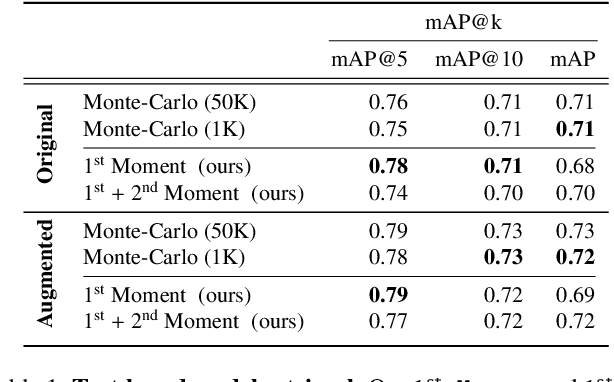
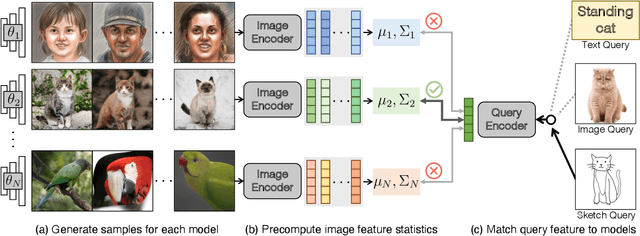
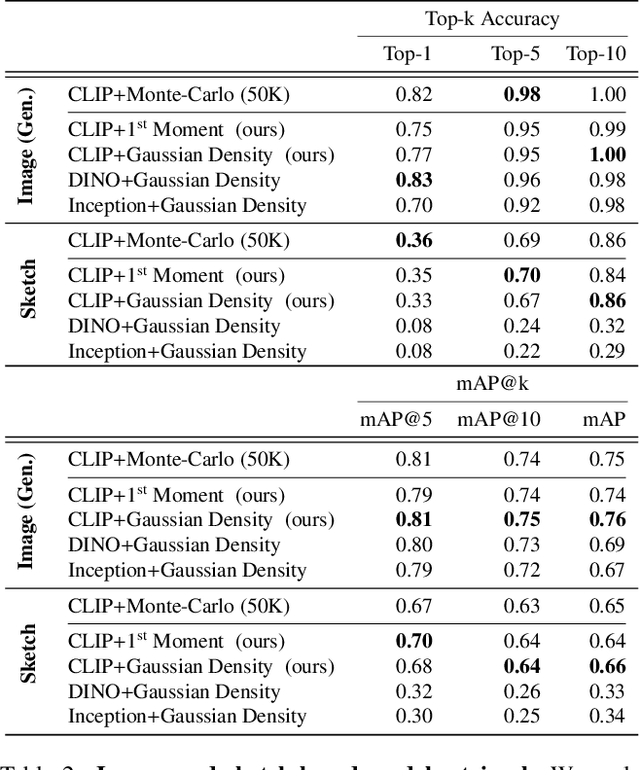
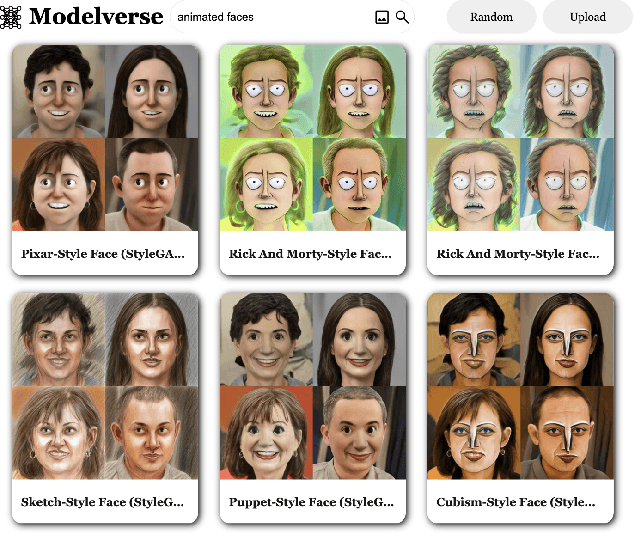
Abstract:The growing proliferation of pretrained generative models has made it infeasible for a user to be fully cognizant of every model in existence. To address this need, we introduce the task of content-based model search: given a query and a large set of generative models, find the models that best match the query. Because each generative model produces a distribution of images, we formulate the search problem as an optimization to maximize the probability of generating a query match given a model. We develop approximations to make this problem tractable when the query is an image, a sketch, a text description, another generative model, or a combination of the above. We benchmark our method in both accuracy and speed over a set of generative models. We demonstrate that our model search retrieves suitable models for image editing and reconstruction, few-shot transfer learning, and latent space interpolation. Finally, we deploy our search algorithm to our online generative model-sharing platform at https://modelverse.cs.cmu.edu.
Meta Deformation Network: Meta Functionals for Shape Correspondence
Jun 26, 2020



Abstract:We present a new technique named "Meta Deformation Network" for 3D shape matching via deformation, in which a deep neural network maps a reference shape onto the parameters of a second neural network whose task is to give the correspondence between a learned template and query shape via deformation. We categorize the second neural network as a meta-function, or a function generated by another function, as its parameters are dynamically given by the first network on a per-input basis. This leads to a straightforward overall architecture and faster execution speeds, without loss in the quality of the deformation of the template. We show in our experiments that Meta Deformation Network leads to improvements on the MPI-FAUST Inter Challenge over designs that utilized a conventional decoder design that has non-dynamic parameters.
 Add to Chrome
Add to Chrome Add to Firefox
Add to Firefox Add to Edge
Add to Edge